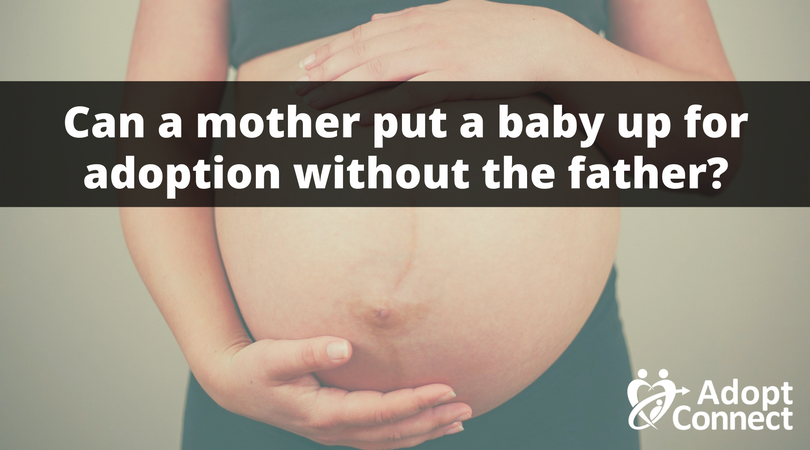Imagine finding yourself in a situation where you desperately want to give your baby up for adoption, but the father doesn’t share the same sentiment. This emotional and challenging predicament presents a myriad of complexities and heart-wrenching decisions. In this article, we will explore the delicate balance between a mother’s desire to provide her child with the best life possible and the father’s responsibility and rights as a parent. Join us as we navigate the difficult path faced by couples in this unique situation, and gain insights into the possible resolutions and support available to those seeking guidance.

Understanding the Different Perspectives
The mother’s reasons for wanting to give the baby up for adoption
As a mother considering adoption, it is essential to understand and communicate your reasons for wanting to give your baby up for adoption. Some common reasons may include financial instability, lack of emotional or physical support, a desire to provide the child with a better life, or simply feeling unprepared for the responsibilities of parenthood. It is important to validate and explore these feelings, ensuring that you have thoroughly considered your options and weighed the potential benefits and challenges associated with adoption.
The father’s reasons for not wanting to give the baby up for adoption
On the other hand, the father may have his own reasons for not wanting to give the baby up for adoption. It is crucial to approach this issue with empathy and open communication. The father may have concerns about losing a biological connection with the child, feeling emotionally attached, or having objections due to cultural or religious beliefs. Understanding and addressing these concerns in a respectful manner is vital for finding a solution that is in the best interests of everyone involved.
Legal Rights and Responsibilities
Exploring the mother’s rights and options
As the mother, you have certain legal rights and options regarding the decision of adoption. It is essential to familiarize yourself with these rights to ensure you can make informed choices. You may have the right to choose the adoptive parents and participate in the adoption process. Additionally, you can explore options such as open adoption, where you maintain some level of contact with the child after the adoption is finalized. Understanding your rights is crucial for navigating the adoption process and finding a solution that aligns with your wishes.
Understanding the father’s rights and options
The father also has legal rights and options when it comes to the decision of adoption. It is important to consider and respect these rights in the decision-making process. The father’s rights may vary depending on factors such as marital status, acknowledgment of paternity, or his involvement in the pregnancy and parenting process. Seeking legal advice can help you better understand the specific rights and options available to the father, enabling you to approach the situation in a fair and equitable manner.
Open Adoption: Finding Common Ground
Explaining the concept of open adoption
Open adoption is an increasingly popular option that allows for ongoing contact between birth parents, adoptive parents, and the child. In an open adoption, you have the opportunity to maintain a relationship with your child, while also allowing them to develop a bond with their adoptive parents. This can take various forms, such as scheduled visits, exchanging letters or emails, or even phone/video calls. Open adoption offers the potential for a more inclusive and transparent approach to adoption, creating a healthy environment for the child to understand their unique story.
Discussing the benefits of open adoption for both parents
Open adoption provides benefits for both birth parents and adoptive parents. For birth parents, it allows them to see their child grow and thrive, providing emotional reassurance and peace of mind. Open adoption can also provide birth parents with a sense of closure, knowing that their child is loved and well-cared for. On the other hand, adoptive parents benefit from having access to important medical information, an understanding of the child’s background, and the ability to answer questions that may arise as the child grows older. Open adoption can foster a sense of extended family, ensuring that the child’s needs are met from multiple perspectives.
Addressing concerns and fears regarding open adoption
While open adoption has its benefits, it is natural to have concerns or fears about this type of arrangement. Communication and open dialogue are vital in addressing these concerns. It is essential to discuss boundaries, expectations, and levels of involvement openly and honestly with both the adoptive parents and the father. Ensuring that all parties have a clear understanding of their roles and responsibilities can help alleviate fears and build trust. Seeking support from professionals, support groups, or counseling services can also be valuable in navigating any challenges that may arise during the open adoption process.
The Role of Mediation
Exploring the option of mediation for conflicting parents
If you and the father face conflicting views on the adoption decision, mediation can provide a constructive and neutral environment to work through these differences. Mediation involves the assistance of a trained professional who facilitates communication, encourages understanding, and helps find common ground. In the context of adoption, a mediator can guide both parties towards a resolution that respects everyone’s perspectives and ultimately prioritizes the child’s best interests.
Highlighting the advantages of seeking professional help
Mediation offers several advantages when dealing with conflicting parents. A professional mediator can bring objectivity and neutrality to the conversation, ensuring that neither party feels unheard or dismissed. They can help uncover underlying concerns, guide communication, and provide a structured framework for finding a mutually acceptable solution. Seeking professional help through mediation demonstrates a commitment to working through differences in a respectful and collaborative manner.
Familiarizing yourself with the mediation process
Before engaging in mediation, it is important to familiarize yourself with the process. Typically, both parents, the mediator, and potentially legal representatives will participate in facilitated sessions. These sessions provide a safe space for open and honest dialogue, where the mediator helps both parties explore their interests, needs, and concerns. The mediator will assist in generating options for resolution and can help create a legally binding agreement, if necessary. Understanding the mediation process will help you approach it with confidence, maintaining a respectful and solution-oriented mindset.

Considering a Co-Parenting Arrangement
Exploring the possibility of co-parenting
Co-parenting is an alternative to adoption that involves joint responsibility and shared parenting between the birth parents, even if they are not romantically involved. This arrangement requires a high level of commitment, cooperation, and effective communication between both parents. Co-parenting can be a viable option if you and the father want to maintain an active role in your child’s life while sharing the responsibilities of raising them.
Discussing the challenges and benefits of co-parenting
It is important to have open and honest discussions about the challenges and benefits of co-parenting. Coordinating schedules, making joint decisions, and maintaining consistent parenting approaches can be challenging. However, co-parenting can also provide the child with the opportunity to have both parents actively involved in their lives, ensuring they have strong relationships with each of their biological parents. Successful co-parenting requires a commitment to putting the child’s well-being above any conflicts or differences between the parents.
Outlining the steps to establish a successful co-parenting arrangement
To establish a successful co-parenting arrangement, several steps should be considered. Firstly, effective communication is key. Maintaining open lines of communication allows for discussing important decisions, addressing concerns, and ensuring the child’s needs are met. Secondly, creating a detailed parenting plan can help establish clear expectations and boundaries between both parents. This plan should cover key aspects such as visitation schedules, financial responsibilities, medical decision-making, and methods of communication. Lastly, seeking professional guidance or attending co-parenting classes can provide valuable insights, skills, and strategies to navigate the challenges of co-parenting successfully.
Seeking Legal Advice
Understanding the importance of legal guidance in adoption cases
Seeking legal advice is crucial when navigating the complexities of adoption. Adoption laws and regulations vary by jurisdiction, and it is essential to understand the legal implications of your decisions. An experienced adoption attorney can provide you with accurate information, guide you through the legal processes, and advocate for your rights. Legal guidance ensures that all parties involved are well-informed and protected throughout the adoption journey.
Finding a reputable adoption attorney or mediator
Finding a reputable adoption attorney or mediator is essential for receiving accurate legal advice. Start by researching professionals who specialize in adoption law or mediation. Consult with multiple professionals to find someone who is knowledgeable, experienced, and empathetic. Consider seeking recommendations from trusted sources, such as adoption agencies or support groups. Working with someone who understands the intricacies of adoption cases can provide you with the guidance and peace of mind you need.
Obtaining information about the legal processes involved
Each adoption case is unique, and the legal processes involved will depend on several factors, such as the jurisdiction, parental rights, and the chosen form of adoption. It is important to obtain detailed information about the legal processes specific to your situation. This may include understanding the requirements for terminating parental rights, consenting to adoption, or finalizing the adoption in court. By familiarizing yourself with the relevant legal processes, you can make informed decisions and proceed confidently in your adoption journey.

Individual Counseling and Support
Recognizing the emotional toll of the situation on both parents
The decision of adoption can bring about a range of intense emotions for both parents involved. It is important to recognize and acknowledge these feelings, as they play a significant role in the decision-making process. Emotions such as guilt, grief, uncertainty, and even relief are common. By recognizing and validating these emotions, you can take steps towards finding a sense of emotional well-being and clarity.
Exploring the benefits of individual counseling for each parent
Individual counseling can provide a safe space for each parent to explore their thoughts, feelings, and concerns surrounding the adoption decision. Counseling offers a supportive environment to work through emotional challenges, gain clarity, and develop coping strategies. Working with a trained therapist who specializes in adoption-related issues can help you navigate the complexities of the decision-making process and ensure your emotional well-being.
Finding local support groups or counseling services
Locating local support groups or counseling services that specialize in adoption-related issues can be beneficial. These resources provide an opportunity to connect with others who may be experiencing similar situations. Support groups offer a safe space for sharing experiences, offering and receiving advice, and finding emotional support. Additionally, counseling services can provide personalized one-on-one support to address specific concerns or challenges. Research local organizations, agencies, or online communities that can connect you with the support you may need.
Considering the Best Interests of the Child
Examining the factors that contribute to the child’s well-being
When considering adoption or co-parenting arrangements, it is essential to prioritize the best interests of the child. This entails examining various factors that contribute to their overall well-being. Factors such as stability, emotional and physical health, supportive relationships, access to education, and cultural or religious identity should be carefully considered. Assessing these factors will help guide your decisions and ensure that the child’s needs are met throughout their life.
Exploring the long-term implications of different parenting decisions
Different parenting decisions, whether it be adoption or co-parenting, have long-term implications for both the child and the parents involved. Evaluating these implications requires thoughtful consideration and consultation with professionals familiar with adoption and child development. Reflect upon how each decision may impact the child’s emotional well-being, sense of identity, and future relationships. Understanding the long-term implications will help you make informed choices that prioritize the child’s best interests.
Ensuring the child’s needs and stability are prioritized
Ultimately, regardless of the decisions made, it is crucial to prioritize the child’s needs and stability. The child’s well-being should guide every step of the adoption or co-parenting process. Regularly assess and revisit the child’s evolving needs, stay informed about their growth and development, and maintain open lines of communication with all involved parties. Prioritizing the child’s needs will contribute to their sense of security and provide them with the best chance for a fulfilling and happy life.

Exploring Alternative Solutions
Considering other family members or friends as potential caregivers
If adoption or co-parenting is not feasible or the preferred option, considering other family members or close friends as potential caregivers may be an alternative solution. This can allow the child to remain within their extended family or familiar circle while receiving the care and support they need. However, careful consideration should be given to the suitability, willingness, and stability of these individuals to take on the responsibilities of raising a child.
Discussing alternative forms of adoption
Alternative forms of adoption, such as kinship adoption or foster-to-adopt, may be worth exploring. Kinship adoption involves the child being adopted by a relative, such as a grandparent, aunt, or uncle. Foster-to-adopt involves providing a temporary home for a child in foster care with the intention of adopting them if they become legally available. These alternative forms of adoption can provide the child with a sense of connection to their biological family while ensuring their safety and well-being.
Exploring the option of temporary guardianship
Temporary guardianship can be considered as a short-term solution while you and the father work through your differences or life circumstances change. Temporary guardianship grants caregiving responsibilities to another person for a defined period, allowing you time to reassess your options or address immediate challenges. This arrangement can provide stability and care for your child while you navigate the complexities of co-parenting, adoption, or any other parental decisions.
Knowing When to Seek Legal Intervention
Understanding when legal intervention may be necessary
In some cases, despite efforts at communication, mediation, and counseling, reaching a resolution may not be possible. When both parents are at an impasse and cannot come to an agreement, it may be necessary to seek legal intervention. Legal intervention allows a court to review and determine the best course of action for the child’s welfare. Recognizing when this step needs to be taken is crucial to ensure that the child’s rights and best interests are protected.
Exploring the consequences of not reaching an agreement
Failing to reach an agreement between the parents can have significant consequences for all parties involved, particularly the child. It can create ongoing conflict, legal disputes, and emotional distress. Without a resolution, the child may lack stability, consistent caregiving, and a clear sense of belonging. Understanding the potential consequences can emphasize the importance of finding common ground through alternatives such as mediation or legal intervention.
Seeking legal assistance if all other options have been exhausted
If all attempts at reaching an agreement have been exhausted, seeking legal assistance is recommended. A skilled adoption attorney can guide you through the legal processes, advocate for your rights, and represent your interests in court if necessary. Legal assistance ensures that your options are explored and considered within the framework of the law. While legal intervention should be a last resort, it provides a path towards resolution and clarity when other avenues have been exhausted.
In conclusion, navigating the complexities of conflicting perspectives when it comes to adoption requires empathy, open communication, and a commitment to the best interests of the child. Understanding each parent’s reasons, exploring legal rights and options, considering alternatives, and seeking professional assistance are all crucial steps in finding a resolution. Ultimately, the goal is to create a positive and stable environment for the child, ensuring their well-being and happiness in the years to come.

